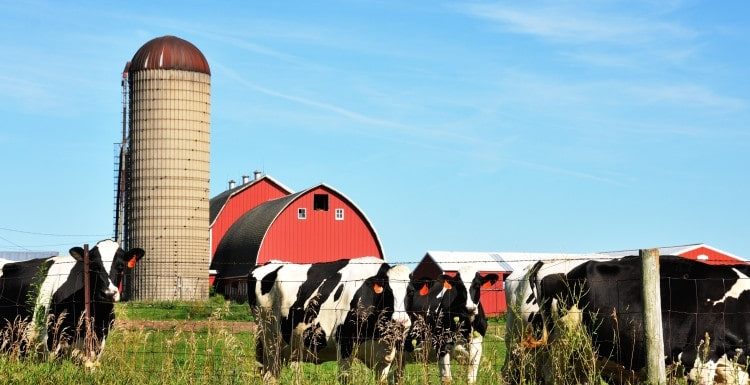
Running a successful farm requires the right tools and equipment. From tractors to balers, grain bins, augers, and more, farming involves many pieces of gear that help farmers produce high-quality crops in a timely manner. It’s important to have the right tools on hand to keep up with any maintenance needs that may arise throughout the farming season. This article will explore the various tools and equipment needed to run a successful farm operation. From tractors and harvesters to grain bins and irrigation systems, we’ll discuss what’s necessary for successful farming operations. We’ll also touch on the importance of investing in quality machinery and using preventive maintenance measures to keep everything running smoothly.
Tractors
Selecting the right tractor for a farming job can be challenging with so many different sizes and options available. It’s essential to select one with the best features for the operation at hand. Generally, larger tractors have greater power and weight capacity than smaller models, making them well-suited for heavy-duty tasks such as plowing fields. However, their power is only sometimes needed, and opting for a smaller model may prove to be more economical while still getting the job done. Additionally, newer technologies are being introduced into tractors that allow them to operate more efficiently, like better fuel economy or improved safety features, which are important aspects to consider when making your purchasing decision. All in all, choosing the best tractor for your farm operations is an important investment that should not be taken lightly.
Trailers and Wagons
For farmers, having the right equipment to transport their crops is essential for successful crop production. Trailers and wagons are two reliable methods of transporting materials across a farm or between farms. Whether it’s a flatbed trailer to move heavy loads, like hay bales, or a small utility trailer to help transport smaller items around the farm, selecting the right trailer can make all the difference in hauling crops efficiently. Wagons are also integral to transporting crops, allowing farmers to easily carry feed and other materials from one field to another. With these two pieces of equipment, farmers have everything they need to keep their farms running smoothly.
Hoes
Hoes are a versatile tool for agricultural work, with numerous uses in the field. Manual hoes are typically used to remove weeds and break up soil clumps, while motorized hoes can save farmers time when tackling larger tasks like digging holes or removing rocks from fields. Moreover, specialized hoes are now available that are designed specifically for various farming activities, such as cultivating crops or working on the hard-packed earth. This versatility has made hoes a mainstay of modern farm operations and an invaluable asset to any farmer.
Harvesting Equipment
Selecting the right harvesting equipment is critical when it comes to getting the job done quickly, efficiently, and with minimal waste. Factors such as size, type of crop, and terrain should be taken into consideration when choosing which machine best suits your needs. Handheld scythes are well suited for small fields or pastures, while larger combine harvesters can easily handle large tracts of land. Innovative features like adjustable threshing drums and a self-alignment system make modern harvesting equipment very efficient in completing the task at hand. Investing in quality harvesting equipment will give you peace of mind knowing that your operation is running smoothly and getting optimal returns from their yields.
Feeders, Waterers, and Troughs
Feeders, waterers, and troughs are necessary tools for farmers raising livestock. Factors to consider when selecting the right setup include herd size, the area allocated for feed, the ages of animals, and the types of feed and water provided. Depending on what kind of livestock they have, farmers should choose the appropriate items to best meet their animals’ needs. The right feeders and waterers can give access to a steady supply of food and water while promoting healthy eating habits. By selecting the right combination of feeders, waterers, and troughs, farmers can provide their livestock with a safe and nutritious environment to live in.
Other Equipment
As any experienced farmer knows, having the right tools and equipment can make all the difference between success and failure in their work. This may include standard items such as shovels for digging, wheelbarrows for hauling supplies, and garden hoses for irrigating crops and cleaning up animal stalls. However, depending on the specific job, specialized tools might be required, especially if your farm caters to special needs or niches to make a profit. For example, a pruning saw for pruning trees or bush shears for shaping shrubs. For this reason, being well-prepared with a broad array of supplies is essential to multipurpose farming operations.
Running a successful farm requires the needed tools and equipment to carry out any task. From tractors and harvesting equipment to hoes, feeders, waterers, and troughs, it’s essential to make sure that you are properly equipped with the right tools for your farming needs. With quality machinery and preventive maintenance measures in place, you can ensure that your farm runs smoothly and produces high-quality crops. Investing in the right tools and equipment for your farm operation can pay off in the long run.
Author Bio:
Kara Masterson is a freelance writer from West Jordan, Utah. She graduated from the University of Utah and enjoys writing and spending time with her dog, Max. While doing research for this article, she learned a lot by looking through the website of Western Pro Feeders.
